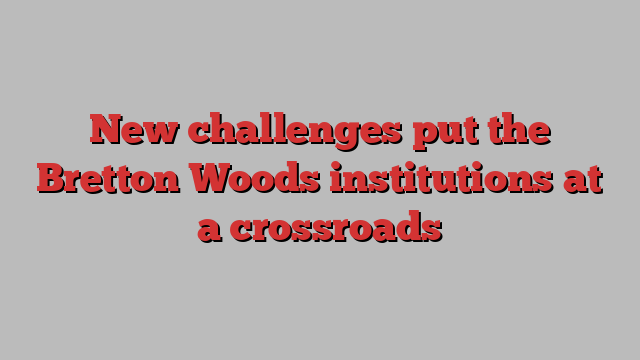
Stay informed with free updates
Simply sign up to the Geopolitics myFT Digest — delivered directly to your inbox.
The writer is a former senior UN and World Bank official and a member of the external advisory panel to the Bretton Woods institutions, together with Patrick Achi, former prime minister of Côte d’Ivoire, and Sri Mulyani Indrawati, outgoing finance minister of Indonesia
Just over 80 years ago, delegates from 44 nations met in bucolic Bretton Woods in New Hampshire. Freed from big city distractions, they agreed over three exhausting weeks the treaties that were to establish two world-changing institutions, the IMF and World Bank.
Kristalina Georgieva and Ajay Banga, the current heads of the two bodies, took a small group of us back there last week to begin a discussion on where next for the Bretton Woods institutions. For a world again in crisis, what can they do to help it recover? Unlike that first conference, whose isolation helped limit developing country and civil society participation, this retreat was meant to begin a wider global debate. The more voices the better.
Expectations are low for multilateralism today in a fragmented world. But many delegates had dodged German U-boats to get to the 1944 conference. The world was far from at peace. Still, the legend was established: statesmanship prevailed and politics seemed suspended. But is that true? In fact, they were consumed by geopolitical rifts that were not dissimilar from those of today.
The Soviets were scowling spoilers on the sidelines. The US had a bee in its bonnet that pre-Mao China must be the fourth largest shareholder — for which there was no economic rationale. The Europeans were convinced the Americans were out to break them on war loans. The handful of developing countries present felt that funding for their advancement was being ignored in favour of Europe’s reconstruction. All the delegates wanted a bigger shareholding than the drafters proposed. In sum, much like today’s messy multilateral negotiations.
Yet war evidently focused minds. Today, a set of new challenges threatens to lay humanity low. The biggest — climate, inequality, and migration — are inherently uncontainable within national borders. As we race through the climate tipping points, water levels could threaten cities from New York to Lagos, Manila to Dubai.
Migration is overwhelming politics in a number of countries. More than 40 per cent of people live in nations where spending on public debt repayments exceeds that on health or education. But the world seems caught on a path of low global growth and inflationary pressures that remove the capacity to take on these challenges, and a broken politics that diminishes the will to even do so.
The same conventional wisdom that says a war was needed to spark bold action in 1944, today argues the contrary: conflicts in Ukraine and the Middle East leave the world too divided to show similar resolution. US-China competition, the rise of middle powers such as India and Brazil and a healthy reluctance of smaller countries to be herded into superpower blocs have compounded a sense of global ungovernability.
Economics may, however, be a bit easier than politics. Democrats and autocrats alike need growth, investment and financial stability. The BWIs rightly have their critics, but they are the leading international public providers of finance, advice and surveillance.
Today, as their relative influence declines in an enlarged global economy, the BWIs are at a crossroads. The UN has called for their revamp. They have had a mixed life cycle of effective post-world war stabilisation. US-Soviet tensions rose. Amid decolonisation and modern state building they became associated with unpopular economic adjustment programmes. A 20-year spurt in global poverty reduction eased the criticism but lost momentum some 15 years ago. Years of drift have followed as health, education and quality-of-life indicators have in many cases gone into reverse.
We want to take the conversation we began last week to town halls and social media audiences around the globe: what can these institutions do to help the world? We have questions around the BWIs’ priorities, governance, economic model, relationships with their country borrowers and partner networks. These must be boldly answered if they are to enjoy the trust and authority to help redirect us back to resilience and growth. Their two leaders have the vision to do just that but the BWIs need to exhibit responsiveness, ambition and accountability in a world no longer shaped disproportionately by a small western male elite. There was only one woman delegate at that original New Hampshire hilltop gathering.
The guns didn’t stop when the first Bretton Woods conference occurred and tragically they may not now as we reach out for ideas for our shared future. As in 1944, that shouldn’t stop us. But this time it’s a conversation for all of us.